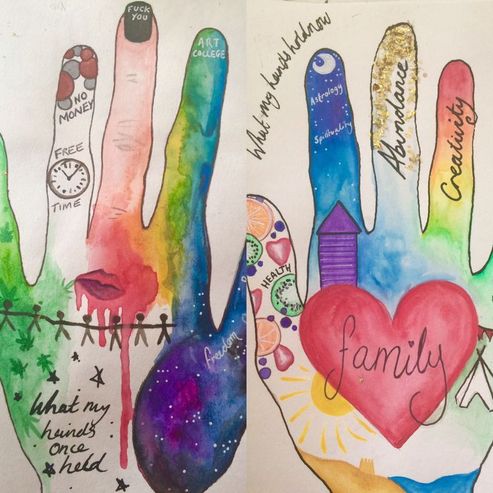|
In my last post I briefly discussed what therapy is, who it is for, and how it works. This post is devoted to the therapist’s love - a complex and magical component, that takes therapy from being “just” an effective tool to a transformative experience.
I have had wonderful therapists, to which I will always be grateful, for supporting me in my unfolding growth process. But it wasn’t until I felt an amazing, special love, in the relationship with my (third) therapist, that I experienced the transformative healing power of the therapeutic love. The therapeutic love, which may also be referred to as “unattached love” or “unconditional positive regard” - is very different than most types of love we experience throughout our lives - it most certainly isn’t romantic love, neither is it a parent-child love, or even the love we feel for a dear close friend, but rather, it is the highest form of love human beings can offer one another. My clients see and feel loved through the look in my eyes, my behavior, and lastly, through my words. Being loved translates to a sense of safety, comfort and ease they experience physically, emotionally and mentally. They have a clear knowing I truly want to see them for who they are, I have no judgment about their thoughts, feelings, circumstances or behaviors, and I have no expectations from them, to do or be or feel or think any certain way. The therapeutic love resonates through the relationship: as it impacts both therapist and client, it reaches far beyond the therapy room, into the core of one’s self, and from there to other relationships. Moreover, it carries on for much longer than the working relationship does. This relationship resembles a heavy, fertile soil in a small pot inside a greenhouse, in that it creates the ideal conditions for something precious to grow. From here my clients can explore, learn, grow, change, accept and thrive. So what is it that allows me, as a therapist, to love my clients in such a deep way, and do I feel that automatically, towards all of them? Let me start at the end: The answer is yes, I do feel that way automatically, towards all of my clients, and as the relationship builds and deepens, the feeling of love also deepens and develops more and more intricate layers. What allows me to feel this love and approach my clients with it, are my empathy and compassion. In other words: When my clients sit with me, I recognize the suffering they feel in myself and in humanity as a whole; I recognize how difficult it is to experience this suffering, let alone share it with another person - a stranger at first; I see the human spirit as beautiful and complex - it cannot and does not comply with simplistic ideas and moralistic notions - no matter how much we want it to; I believe we all do the best that we can at any given moment, considering who we are and the circumstances we are facing; I do not believe we are self-destructive, but rather that we have strong survival needs that might pull us in opposite directions, lest we become aware of them and fully understand them; I understand hurting others is a painful yet often unavoidable consequence of the search for authenticity; I have no agenda about how anybody’s life should be lived and believe my only role, is to support my clients in exploring who they truly are - this exploration cannot be limited by what most of us have been conditioned to think and feel throughout our lives. Experiencing such compassion and empathy translates into feeling, and consequently offering, therapeutic love: unattached, unconditional positive regard. To those of you who wonder whether this approach works for teens, especially those who have behavioral issues, the answer is yes!!! Teens, sometimes more so than adults, need a space to explore their feelings and needs freely, in the presence of a responsible loving, nonjudgmental adult. To sum it up, I wanted to devote this post to the exploration of the unique experience of the therapeutic love since I feel it’s not addressed or spoken of too often - possibly because, much like any other type of love, it is so hard to define and complex to describe. Guided by my own experiences as a client, I aspire to experience this magical love with my clients. I urge one and all to look for this beautiful quality in therapy - it can be found.
2 Comments
So... what is therapy? Who needs it? How does it work?
Let me put it simply: Everybody can benefit from therapy. Often when I say that, people take offence by it, as if I am saying something is wrong with them, and making an assumption about their mental health. To understand my statement I need to explain what therapy is: Therapy is a general name for a practice, designed to help us take care of our emotional, mental and even spiritual well being. So if I was to say: “everybody can enjoy a spa day”, there would be more of an agreement about that, right? Maybe a few people would say: "Spas aren’t for everybody. I really hate massages and I can’t relax in a hot tub!" Well then, what if you could just get a foot massage? Or a manicure? Or just sit by the pool and relax in the sun? Would that be something you’d be interested in? Therapy is similar in that it is a general name for a huge variety of services, all of which focus on the emotional\mental well being of us, human beings. So, keeping that in mind, let’s go back to my bold statement and refine it: everybody can benefit from different types of therapy, at one point or another of their lives. I truly believe the world would be a better place if therapy (i.e. mental health services) would be accessible to everyone. I also wish getting emotional support wouldn’t have the negative stigma it unfortunately still has for many people. If you tend to think seeking therapy will reflect badly on you, try thinking about it this way: if you have a physical issue, you take care of it by going to the doctor. There is no reason our approach should be different when it comes to our mental health. People usually seek therapy when they need help managing their lives and\or emotions. They might feel an array of emotions, such as sadness, confusion, anxiety or anger (just to name a few) and their overall sense is that something is wrong with them or with their lives. The rise in emotions is often prompted by all sorts of life situations and circumstances (relationships, transitions, grief, life stages etc.), or it can be a low point in an ongoing process of decline. Often people need help managing those emotions and making sense of them, and they really just want them to stop. And more often than not, they want to make better choices, or change things in their lives, by working through those emotions and life situations. And now to the “mother of all questions”: how does therapy work? Well, let’s go back to that wonderful spa day I was talking about. Different services help different areas in different ways: getting a manicure might help you feel better by making your hands look good, while getting a deep tissue massage relaxes your muscles and releases tension. Similarly, different therapies help different areas in our lives, in different ways: Cognitive Behavioral Therapy (CBT) teaches ways to change behaviors through changing the way you think of things and is very effective for treating anxiety and depression; Depth Psychology offers ways to look deeper into your history and see how they affect your present, so it’s very effective for people who are experiencing deep and existential crisis; and Eye Movement Desensitization and Reprocessing (EMDR) is extremely helpful in treating post traumatic stress disorder (PTSD). Despite of this somewhat crude and generalized description, if you are dealing with any of the above mentioned symptoms, you might consider looking for therapists with these specialties. It is important to understand that no matter what specialty you are looking for, the most significant factor in therapy is the relationship with your therapist. I will explore this element deeper on my next post, but for now, I just want to emphasize how imperative it is to find a therapist that fits not only by their qualifications, but by their personality and by the chemistry you have with each other. There are too many people out there who believe therapy “doesn’t work” because the relationship they had with their therapists wasn’t strong enough to make an effect. If you are seeking therapy, don’t hesitate to contact and\or meet with more than one therapist, before you make your choice. There are several search engines that are effective resources you can browse through in order to get an idea about therapists in your area. Yelp - https://www.yelp.com/ Psychology Today - www.psychologytoday.com And Google - www.google.com , just to name a few. Many therapists, myself included, offer 15 to 20 minutes consultation calls, free of charge, which is a great way to “feel out” the therapists who you might consider seeing, based on their websites, or other referral sources. To sum it up, therapy is the practice of creating change in our lives through healing our hearts and minds; anyone can benefit from it, and it works by two major components: the chemistry with our therapist and the specific expertise they have that matches our needs. If you are struggling emotionally right now and you are seeking support, you might consider the simple points I made to start figuring out how to precede. |
AuthorMaya is a marriage and family therapist, working primarily with teens, families and adults, in the east bay, California. Archives
October 2018
Categories |


 RSS Feed
RSS Feed